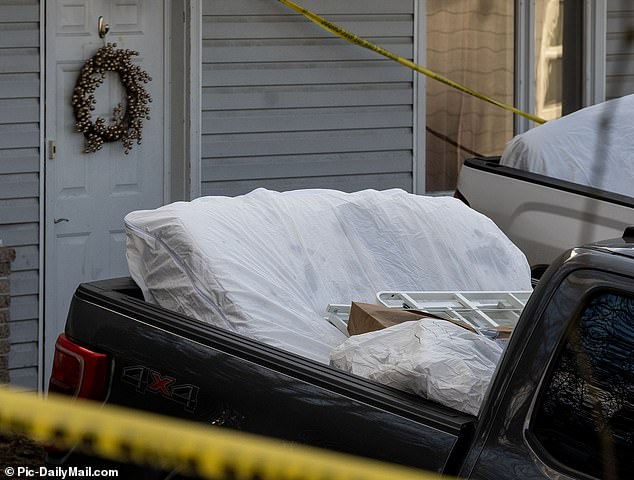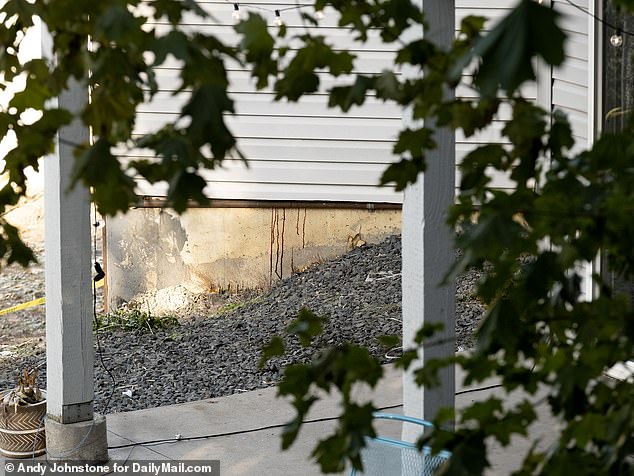Bryan Kohberger trial date is finally set after nearly two years after Idaho murders
Suspected quadruple murderer Bryan Kohberger has set his trial date for June 2025, after years of delays.
The 29-year-old’s successful trial in the November 2022 murders of four University of Idaho students is expected to last up to three months.
Kohberger, a doctoral candidate in criminology, appeared in court Thursday for a hearing. His attorney reiterated her request to change the venue, citing concerns he would not receive a fair trial.
Kohberger is accused of killing Kaylee Goncalves, Madison Mogen, Xana Kernodle and Ethan Chapin in their off-campus home.
Suspected quadruple murderer Bryan Kohberger has his trial date set for June 2025

Kohberger is accused of killing University of Idaho students (L-R) Kaylee Goncalves, Madison Mogen, Ethan Chapin and Xana Kernodle on November 13, 2022
Kohberger’s first trial date was set for October 2023. However, his lead defense attorney Anne Taylor has requested multiple extensions and further hearings since his arrest. His team postponed the revelation of his official alibi until May 2024.
When he finally presented the alibi, prosecutors tore it apart, as Kohberger claimed he “drove alone” on the night of the murders “to look at the moon and stars.”
In that filing, Taylor said she would bring in an expert in phone data analysis to support his claims that he was miles away from the scene, one of the pieces of evidence prosecutors and defense have repeatedly clashed over.
During Thursday’s hearing, both sides discussed deadlines for submitting evidence in court, including what could be used toward his conviction if he is found guilty.
Latah County officials have announced they plan to seek the death penalty if he is found guilty of the gruesome murders.

The off-campus house where the four gruesome murders took place was demolished in December due to delays, despite calls from the victims’ families to keep it standing

The way the killer navigated the three-storey house in the early hours of a November morning to kill the four students – who slept in separate rooms and floors – has raised questions about his motives and possible knowledge of the layout.

Boyfriend and girlfriend Ethan Chapin (left) and Xana Kernodle (right) were murdered in bed together in November 2022 in the gruesome murders

The victims’ families have shared their frustration at the endless delays, with Kaylee Goncalves’ mother (left, with Madison Mogen) saying: ‘It’s heartbreaking how slowly everything has to move. Why does this have to be brought up like this?’
Kohberger has maintained his innocence since his arrest in December 2022, more than a month after the murders that shocked the nation.
The month-long search for the alleged killer led to widespread media attention, with the victims’ families using the spotlight to condemn the proceedings against Kohberger.
In December 2023, victim Kaylee Goncalves’ mother said the trial was “heartbreaking.”
‘It’s heartbreaking how slowly everything has to go. Why does this have to be brought up like this?’ Kaylee’s mother Krisi said in an interview with KHQ.
“It’s important, I get it, but there are facts, we have certain facts, we have certain knowledge. I can’t believe it works like this.”

Cell phone records provided by prosecutors show that the route Bryan Kohberger allegedly drove on the night of the brutal killings in Idaho could be a crucial piece of evidence in the state’s case against the 28-year-old. In his new alibi filing, his lawyers say they plan to dispute this information

Prosecutors allege surveillance footage showed a white Hyundai that resembled Kohberger’s as he fled the scene of the crime

In January 2023, investigators were seen removing a blood-stained mattress from the home where four University of Idaho people were murdered

The scenes inside the house were so gruesome that blood was seen dripping down the outside of the property’s wall, in what investigators described as the worst crime scene they’ve ever seen.

Detectives found a Ka-Bar knife sheath on the bed containing the bodies of Mogen and Goncalves. DNA on the sheath was later statistically matched to Kohberger through genealogical testing
In December, authorities in Idaho came under fire again after the off-campus house where the four students were stabbed to death was demolished against the wishes of the victims’ families.
Although both the prosecution and defense agreed it should be demolished, the families protested, with Goncalves’ loved ones fearing the move would “destroy one of the most crucial pieces of evidence in the case.”
Before the house was demolished, the scenes inside the house were so gruesome that exclusive footage from DailyMail.com showed blood seeping down the outside of the house.
When he was arrested, prosecutors cited partial DNA matches found on a Ka-Bar knife sheath found at the home. No murder weapon was ever found.
In an ongoing argument over such evidence in court — including cellphone records and surveillance of Kohberger’s car at the crime scene — the defense contended that prosecutors have not turned over what they could present in court.
Taylor filed a motion last month to compel the defense to do so. The defense argued that because of the FBI’s involvement in the case, they are limited by certain federal laws.
The defense has also filed a motion to dismiss the entire case, claiming he was indicted by a biased grand jury and that the case was tainted by prosecutorial misconduct and the admission of invalid evidence. The motion was denied.
